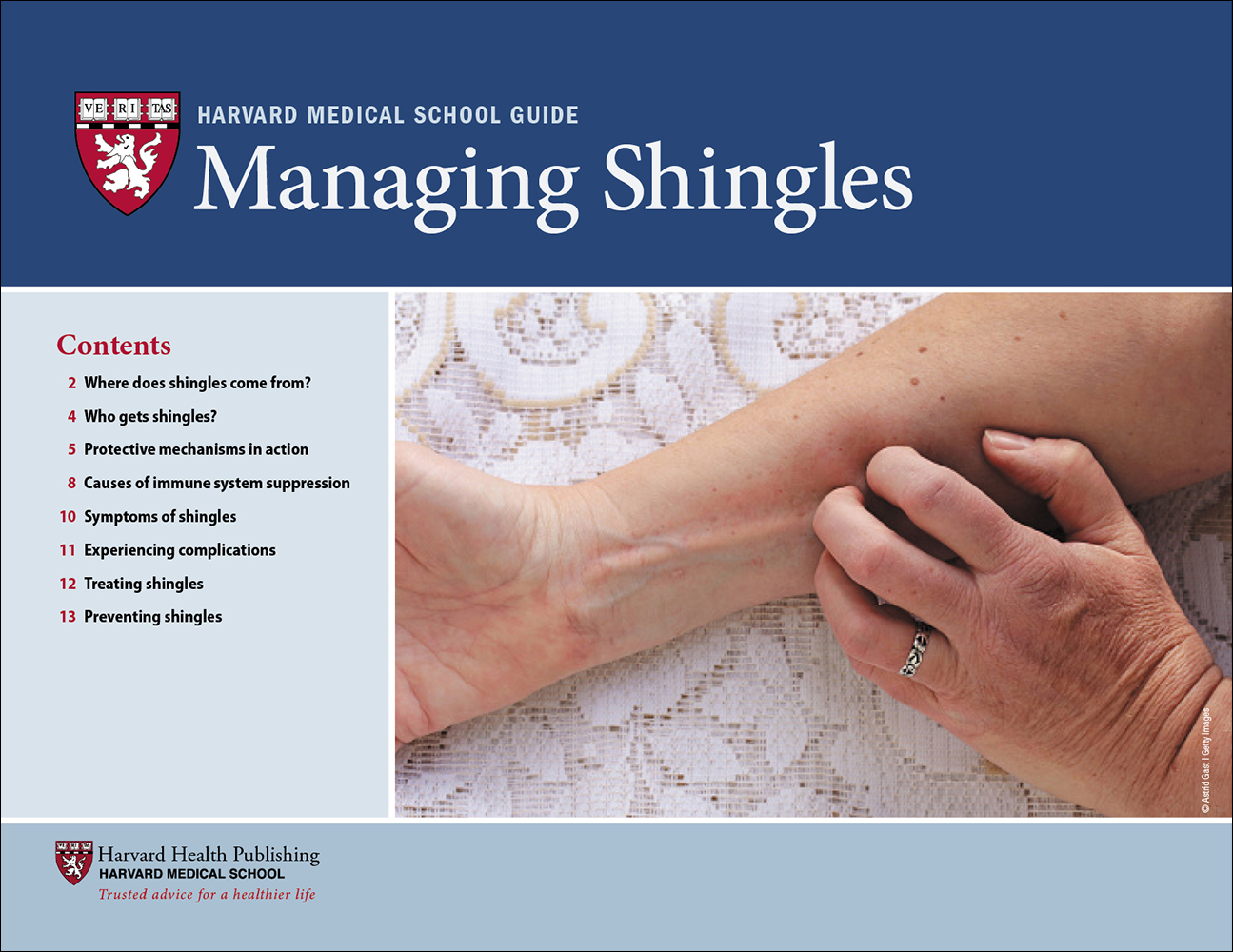Answers to common questions about shingles
This painful condition is unique in many ways. Our expert explains how it works and how to prevent it.

Shingles is definitely an illness to avoid if you can. Known for its blistering rash, shingles is uncomfortable and sometimes leads to long-lasting complications, including a painful nerve condition called postherpetic neuralgia. While it can affect people of any age, including children, it's most likely to strike after age 60.
Shingles is also somewhat unusual. It's caused by a virus that has often been living inside the body for decades. That means it differs from most viral infections in how you get it and how you can prevent it. We asked Michael Starnbach, a professor of microbiology at Harvard Medical School, to answer some common questions about shingles. Below are his responses.
Q. How do I get the virus that causes shingles?
A. Shingles is caused by the varicella-zoster virus, which you probably encountered decades ago when you got chickenpox as a child. After your chickenpox infection cleared, the virus stuck around. It took up residence in nerve cell clusters in your spine or at the base of your skull. There it stayed dormant, held in check by your immune system. But it can reemerge as shingles.
Q. Does everyone who had chickenpox get shingles?
A. No. Although anyone who has had chickenpox is at risk for the condition, only an estimated one in three of those people will actually get shingles. It's not clear why some people get it and others don't. It may have something to do with your immune system. If your immune system is compromised by an illness, surgery, or medication, the virus may be able to shake off its slumber and reactivate. When it does, it typically causes a blistering rash, which often appears as a thick stripe across your ribcage or on the side of your face. It may also bring a painful or burning sensation on the skin, headache, fever, and fatigue.
Q.Is shingles contagious?
A. Yes and no. If you come in close contact with someone who has shingles, you can't catch shingles. But you can be infected with the varicella-zoster virus and develop chickenpox if you aren't vaccinated against the virus and haven't had chickenpox in the past.
If you do develop shingles after you were around someone who had a shingles infection, it came from the virus that was already present inside you, not from the new exposure.
Q. Can a vaccine trigger shingles? My friend got shingles shortly after receiving her COVID-19 vaccine. Is it just a coincidence?
A. There have been anecdotal Internet reports of shingles following both COVID-19 infection and vaccination for COVID-19. But there isn't sufficient statistical or scientific evidence to show a connection. Just because the two events occur near to each other doesn't mean they are related.
Any medical intervention, even vaccines as safe as the COVID-19 vaccines, can cause health problems in a very small number of individuals. The vaccine manufacturers and U.S. regulatory agencies track these reactions carefully to determine if there is an association between a particular vaccine and an adverse outcome.
Doctors continuously weigh those risks and have uniformly concluded that it is much, much more likely for you to remain healthy if you take the vaccine, despite the super-low risk of an adverse reaction.
Q. Can you get shingles more than once?
A. Unfortunately, you can. Studies have found that there is approximately a 5% risk of getting a second or a third case of shingles within eight years of your first. This is why doctors recommend that people get the shingles vaccine even if they have already had shingles in the past.
Q. How common are complications from shingles?
A. A small percentage of people who get shingles experience complications. Approximately 10% to 18% of people develop the nerve pain known as postherpetic neuralgia. About 1% to 4% of people experience other complications that require a hospital stay, such as skin infections or eye-related problems.
Q. Is there a cure for shingles?
A. No, nothing can cure a shingles attack. However, antiviral medications may help you recover more quickly and reduce your chances of developing complications. These medications, which include acyclovir (Zovirax), famciclovir (Famvir), and valacyclovir (Valtrex), work by blocking the virus's ability to reproduce. When there is less virus present, your immune system has a better chance of getting the reactivation under control.
Be certain to reach out to your doctor quickly if you suspect you have shingles, because these drugs work best if they are started within 72 hours of the start of symptoms.
Q. What is the best way to prevent shingles?
A. The best way to avoid a painful case of shingles is to get vaccinated. The FDA approved the Shingrix vaccine in October 2017. A few years after Shingrix was approved, an older shingles vaccine called Zostavax was discontinued because it was much less effective.
Shingrix is recommended for adults over age 50 and is given in a series of two injections, six months apart.
Q. Is there anything I can do to help relieve shingles symptoms?
A. The most bothersome symptoms associated with shingles are typically itching and pain related to the rash. There are a number of strategies that may help. For pain, try
- cool compresses
- an over-the-counter pain reliever, such as ibuprofen (Advil, Motrin) or acetaminophen (Tylenol)
- a topical pain-relieving cream containing capsaicin (such as Zostrix).
If your pain isn't responding to these interventions, your doctor may want to prescribe recommend a topical numbing agent called lidocaine (Xylocaine, others) or use an injected medication in a procedure called an intercostal nerve block.
The best options to help relieve itching are
- soaking in a colloidal oatmeal or starch bath
- applying calamine lotion
- taking an oral or topical antihistamine, such as diphenhydramine (Benadryl).
Whenever possible, try to keep your shingles rash clean and covered with sterile bandages to prevent infection.
Q. I already had the Zostavax vaccine. Do I need to get vaccinated with Shingrix?
A. Yes, it is recommended that you get the Shingrix vaccine even if you already had the older vaccine. The newer vaccine is far more effective. Shingrix is more than 90% effective at preventing a shingles attack. If you are vaccinated and do end up getting shingles, you will likely experience a much milder infection and will be less likely to develop complications.
Q. Does the vaccine have side effects?
A. Most people who get the shingles vaccine will only experience mild side effects, such as redness or pain at the injection site, fatigue, chills, muscle pain, or stomach upset. While these side effects are temporary, they may be enough to make you feel crummy for a couple of days.
In rare cases, people may experience an allergic reaction to the vaccine. Seek emergency medical attention if you experience hives, swelling in your face or throat, trouble breathing, or dizziness, weakness, or a fast heartbeat.
Q. Are there any lifestyle changes that I can make to prevent shingles?
A. Keeping yourself and your immune system healthy won't guarantee that you'll never get shingles, but it may reduce your risk. Eating a healthy diet, getting regular exercise, reducing stress, and getting the right amount of sleep at night can keep your immune system functioning well. But keep in mind that immune function naturally tends to decline with age. So, even if you do everything right, you may still get shingles down the line. Getting vaccinated is the best way to reduce your risk.
Image: © franciscodiazpagador/Getty Images
About the Author

Kelly Bilodeau, Former Executive Editor, Harvard Women's Health Watch
Disclaimer:
As a service to our readers, Harvard Health Publishing provides access to our library of archived content. Please note the date of last review or update on all articles.
No content on this site, regardless of date, should ever be used as a substitute for direct medical advice from your doctor or other qualified clinician.
















